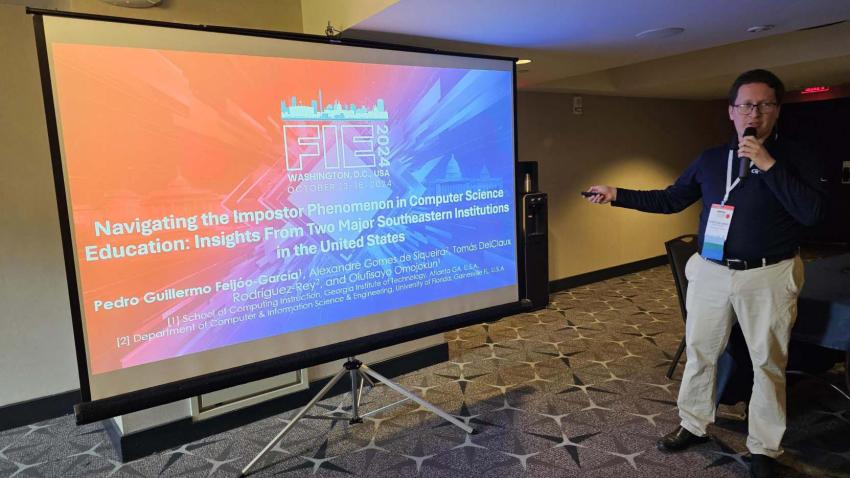
SCI Lecturer Presents Research Exploring the Impostor Phenomenon in CS
The impostor phenomenon, where individuals doubt their accomplishments despite evident success, is a significant issue among computer science (CS) students.
School of Computing Instruction (SCI) Lecturer Pedro Guillermo Feijóo García recently presented research at the 2024 Institute of Electrical and Electronics Engineers (IEEE) Frontiers in Education conference in Washington, D.C., examining the prevalence and impact of the impostor phenomenon in CS students.
The research team included SCI Chair Olufisayo Omojokun, University of Florida Instructional Assistant Professor Alexandre Gomes de Siqueira, and University of Florida alumnus Tomás Delclaux Rodríguez-Rey. They surveyed more than 500 undergraduate students from both institutions to understand how feelings of self-doubt and fraudulence affect academic performance.

Key Findings
The study found that over 60% of students reported experiencing impostor feelings, with higher rates among female participants. At Georgia Tech, 63% of students reported these feelings, with 68% of female students affected, compared to 62% of males and 29% of other gender identities.
At the University of Florida, these rates were higher for females (80%) and lower for males (57%), while students of other gender identities experienced impostor phenomenon at 67%.
“More than 60% of participants reported impostor feelings, which is significant,” Feijóo García said. “Computer science students, among STEM populations, are at the highest risk of mental well-being issues.”
Institutional and Demographic Variations
The team analyzed data from CS students at Georgia Tech and the University of Florida to see how institutional background impacts impostor phenomenon scores.
“Our findings suggest that the institution does play a role, likely influenced by factors such as state policies, diversity initiatives, and community demographics,” Feijóo García said.
Their research revealed differences in impostor feelings based on gender, institutional environment, and race.
For example, students of other gender identities showed stark institutional differences: 29% at Georgia Tech versus 67% at the University of Florida.
“We found some differences when analyzing the interplay of institutional background and gender, and also some differences from the experiences of Afro-Black American students,” Feijóo García said.
The study revealed differing trends between the two institutions for Afro/Black American participants. At Georgia Tech, only 23% of Afro/Black American students reported experiencing "frequent" or "intense" impostor feelings. In contrast, this rate was predominantly higher at 75% at the University of Florida.
The researchers noted that these differences might stem from the varying representation and socio-cultural dynamics in the states where the institutions are located. These findings underscore the importance of developing targeted interventions to address the unique challenges faced by students from diverse backgrounds.
Building Community and Collaboration
A key theme from the study was the role of community in alleviating impostor feelings. Feijóo García emphasized the importance of supportive academic environments.
He suggests that fostering more collaboration and community among students early in the curriculum could help address their feelings of impostorhood by allowing them to share experiences with their peers and letting them know they are not alone in their journey.
Future Directions: Expanding Research
Looking ahead, the research team plans to explore the role of “hidden curricula”—the unspoken expectations and norms embedded in academic environments—in contributing to CS students’ mental well-being.
"It’s important to let students know they’re not alone. When two top public institutions show this prevalence, it indicates systemic issues that educators need to address," Feijóo García said.
By highlighting the interplay of gender, race, and institutional context, the study calls for a culturally informed approach to addressing the impostor phenomenon, ensuring all students can excel in an equitable and supportive academic environment.
As computing revolutionizes research in science and engineering disciplines and drives industry innovation, Georgia Tech leads the way, ranking as a top-tier destination for undergraduate computer science (CS) education. Read more about the college's commitment:… https://t.co/9e5udNwuuD pic.twitter.com/MZ6KU9gpF3
— Georgia Tech Computing (@gtcomputing) September 24, 2024


